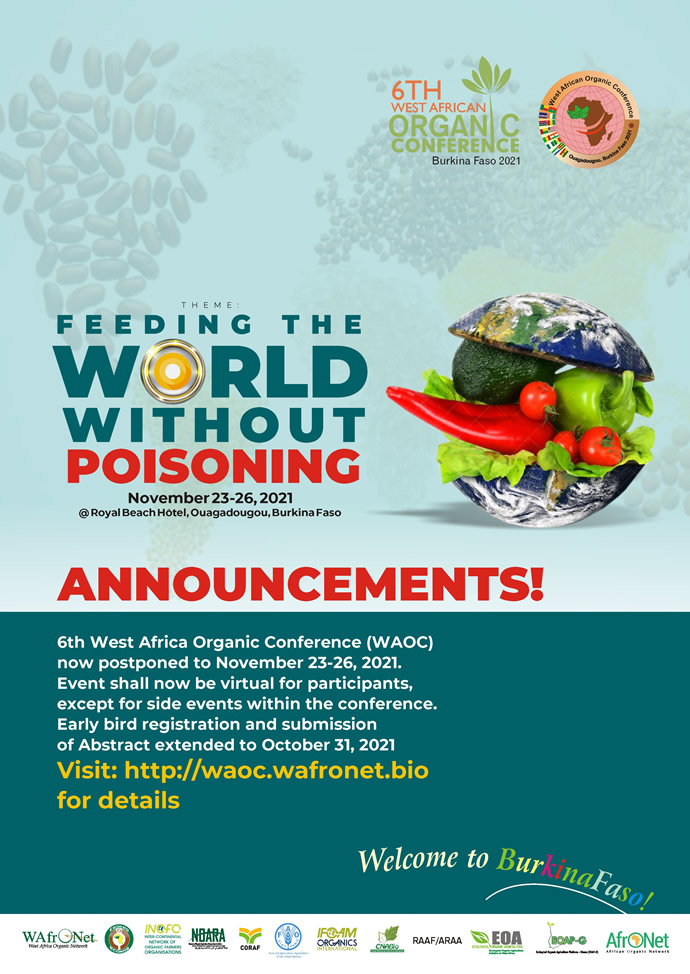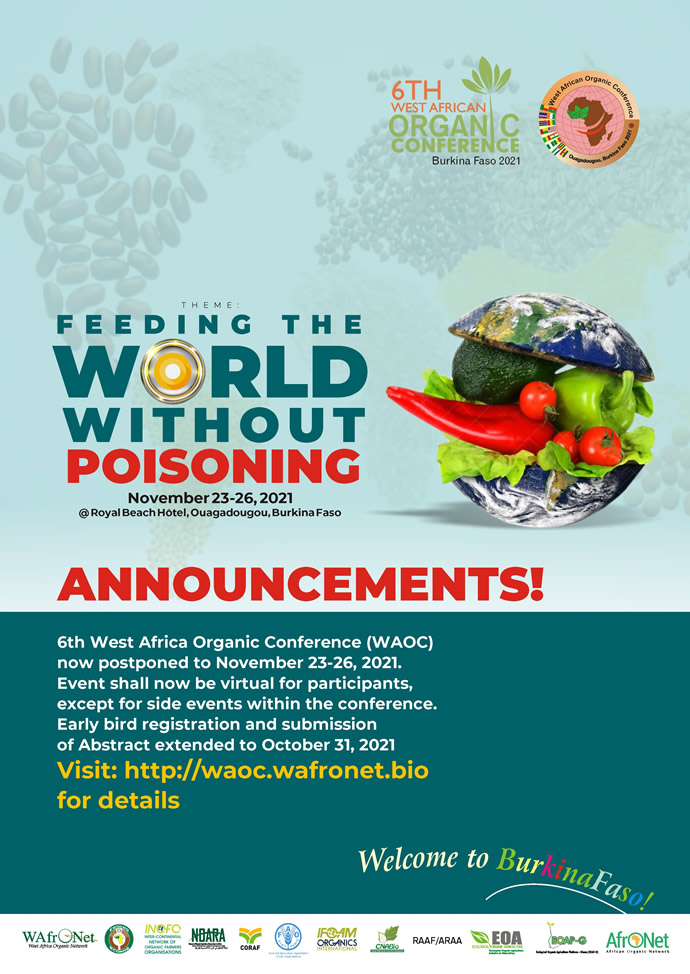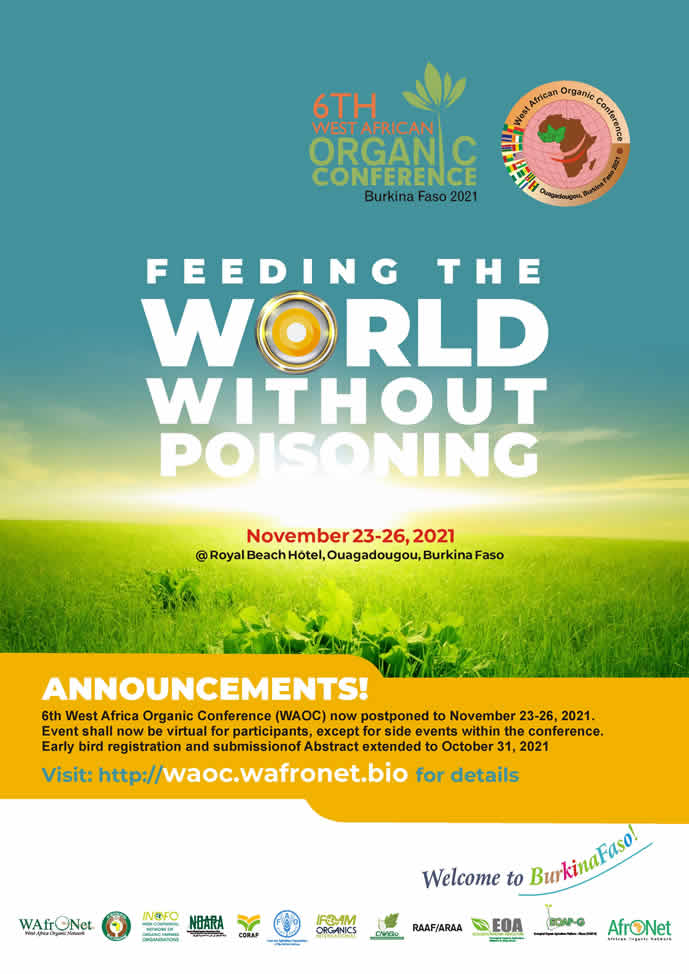About the Conference
Burkina Faso 2021
6th WEST AFRICAN ORGANIC CONFERENCE
November 23 – 26, 2021
Venue: Ouaga 2000 International Conference Centre in Burkina Faso
THEME: Feeding the World Without Poisoning
CALL FOR PARTICIPATION
About the conference
The West Africa Organic Conference (WAOC) is an initiative of the West Africa Organic Network (WAfrONet) with support of the Economic Community of West Africa States (ECOWAS) and several other multi-stakeholders national and international organizations (farmers/ producers, researchers, marketers, policy makers, etc.) in organic and ecological agriculture sectors.
Importance of organic agriculture in national food security, health, biodiversity, environment conservation and fight against poverty are increasingly being recognized in Africa and all over the world. Despite the on-going progress being made in the organic agriculture / farming sector in Africa, the development of this sector in West Africa is still poor. Although, the African Western Union Economic and Monetary (UEMOA) and the Economic Community of West Africa States (ECOWAS) have each laid down a common agricultural policy, but these policies are yet to properly address the decision of Africa Heads of States on organic farming /agriculture.
Organic and Ecological Agriculture stakeholders in Africa are becoming increasingly numerous and more dynamic, with willingness to step up agricultural development in the continent. These stakeholders are also concerned in balancing the problems of social equity and biosecurity in the world. The first West African Organic Conference (WAOC) took place in Abeokuta Nigeria in 2008 and four other ones have successfully been held in Nigeria (2012), Benin (2014), Mali (2017), and Ghana (2019).
Thus, after the successful organisation of the 5th West African Organic Conference (WAOC) that took place in 2019 with over 350 participants from different continents, the 6th WAOC will be taking place in Burkina Faso from November 23th to 26th, 2021. The Local Organizing Committee of the event is anchored by CENABio under the auspices of Burkina Faso’s Ministry of Agriculture in collaboration with the West African Organic Network (WAfrONet), the Ecological Organic Agriculture (EOA) West African Regional Cluster, and other partners like African Organic Network (AfrONet), IFOAM Organics International, the Food and Agriculture Organization (FAO), the West and Central African Council for Agricultural Research and Development (CORAF/WECARD), the Intercontinental Network of Organic Farmers' Organisations (INOFO), the Regional Agency for Agriculture and Food (RAAF), the Network of Organic Agriculture Researchers in Africa (NOARA) and other strategic stakeholders in West Africa.
Objectives of the Summit:
- To showcase the potentials of organic and ecological agriculture in the transformation of national and regional economy, ecologies, and livelihoods through income growth, climate change adaptation, food sovereignty, and trade.
- Sharing knowledge, information, experiences, and skills among all stakeholders of organic and ecological sectors in West Africa.
- To present scientific evidence on the capability of organic agriculture in contributing to healthy living and transformation of the national and continental economy, enhancement of systems resilience, and mitigation of climate change, among others.
- The platform for uptake of organic alternatives through south-south collaboration, especially, in the sharing of experiences.
- Exhibition of organic produce and products to stimulate national, regional, and international trade, linking producers to markets.
- To showcase and publicize the benefits of organic and ecological agriculture for consideration of policymakers, organic stakeholders, and the general public.
- The platform for national and regional policymakers to interact on organic and ecological issues.
Specific objectives of the 6th West African Organic Conference
Tracks/ Sub-themes
- Research Track
Sub-theme: Collaborative and crosscutting innovative research for safe food production in West Africa
Topics:
- Sustainable technological innovations for ecological and organic agriculture value chain
- Strategies for efficient and diversified organic inputs vis-à-vis growing demand
- Challenges of organic agriculture stakeholders in Africa
- Sustainable innovations to reduce the impact of climate change, Health and Environmental challenges
- Farmers/ Seeds Track
Sub-theme: Healthy farmers, healthy citizens
Topics:
- Environmental impacts of EA/ OA practices
- Strategies for efficient and diversified organic inputs in the face of growing demand
- Promotion of indigenous seed
- Capacity building of producers of organic fertilizers and phytosanitary products to facilitate distribution and access to subsidies.
- Policy Track
Sub-theme: Enabling environment for safe food production in West Africa
Topics:
- Regional integration of projects and programs into the OA /EA sectors
- Contribution of national and regional governments to strengthening the supply of quality products for the benefit of the populations
- Mechanisms for limiting the import and use of chemical inputs: monitoring and implementation
- Capacity gap assessment of organic and ecological agriculture stakeholders in West Africa (EOA West Africa Cluster)
- Participatory Guaranty System (PGS) for West Africa
- Development of organic agriculture policies at National and Regional levels
- Trade/ Marketing track
Sub-theme: Sustainable value chains for food systems and true cost accounting
Topics:
- Promotion of EA/ OA initiatives, visibility of labels and organic and ecological products
- Financing organic agriculture for market feasibility
- Development of an organic database to showcase the contribution of ecological and organic agriculture to enhance national economy and food security
- Enhancing organic certification system for easy access to agricultural subsidies (inputs and equipment) by organic stakeholders.
- Socio-economic impacts of organic and non-organic products on national and regional economies.
- Food consumption patterns and population health: Health benefits of organic and ecological agriculture over other types of agricultural systems.
Conference Fees
|
Track/ Event |
Digital (EUR) |
Physical/ In-person(EUR) |
||
|
Early |
Late |
Early |
Late |
|
|
Compulsory |
||||
|
General (plenary) |
45 |
50 |
135 |
150 |
|
Student |
25 |
30 |
40 |
50 |
|
Optional |
||||
|
Scientific: |
45 |
50 |
45 |
50 |
|
Student |
15 |
20 |
25 |
30 |
|
Trade/ Market |
45 |
50 |
45 |
50 |
|
Farmers |
25 |
30 |
15 |
20 |
|
Policy |
45 |
50 |
45 |
50 |
|
Exhibition |
170 |
200 |
260 |
300 |
|
Field trips |
15 |
20 |
45 |
50 |
|
Side events (organizations or groups) |
450 |
500 |
1,400 |
1,500 |
|
WAfrONet General Assembly |
45 |
50 |
50 |
70 |
Explanation
1) Someone wants to register to attend only the plenary section as a student, the person only pays Euros 25 for early registration.
2) A farmer wants to attend farmers track or any other track without the presentation of papers, the person pays Eur 45 + 25 = Eur 70.
3) A researcher, policymaker, or marketer wants to attend any track or make a presentation, the person pays Eur 45 + 45 = Eur 90 as early registration.
4) Any other optional components like a field trip and General Assembly of WAfrONet attracts corresponding charges, while exhibition and side events are for organizations interested in such.
PARTICIPANTS
The following are the expected participants and beneficiaries of the Summit:
- Organic agriculture practitioners/entrepreneurs in West Africa.
- ECOWAS
- National and regional Ministries of Agriculture, Ministry of Environment, and other related governmental agencies.
- Researchers, academics, and students.
- NGOs, Community-based organizations (CBOs)
- International developmental partners.
- Farmers organizations ( national, regional, and local)
- Entrepreneurs and other interested individuals.
CALL FOR PRESENTATIONS, PARTICIPATION, AND SPONSORSHIP
(Papers and success stories by farmers/ producers)
Appropriate papers addressing the theme and topics under sub-themes of the conference are requested.
FIRST STEP
Register online at http //waoc.wafronet.bio/register
Deadline – November 6, 2021
SECOND STEP
Submission of stories video clips to 6thwaoc@gmail.com
Deadline– November 6, 2021
- SUCCESS STORIES BY FARMERS/ PRODUCERS
First stage - A page poster presentation with name, location, and success story
Second stage – A 3 – 5 mins video clips of specific success stories in organic agriculture production.
- PAPER SUBMISSION
First step: Abstract, not more than 300 words (double spacing, Times New Roman and font 12) should be submitted to 6thwaoc@gmail.com ……
Deadline – November 6, 2021
Second step: Full papers of accepted Abstracts to be submitted at https://publications.noara.bio/6th-organic-conference. Authors are to indicate the sub-theme and topic their article is
Please note that all finally accepted full papers will be published in the Conference Proceedings, while those evaluated acceptable journals will have the opportunity to be published in the African Journal of Organic Agriculture and Ecology (AJOAE).
Deadline for full paper submission – November 6, 2021


